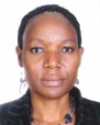Jolly Magulu
ID: UNCST-2021-R013833
|
Psychiatric comorbidities of Epilepsy and treatment gaps among children and adolescents attending children\'s outpatient of Butabika National Referral Mental Hospital in Kampala,
Uganda
REFNo: HS1465ES
General objective
To determine the prevalence of psychiatric comorbidities of epilepsy and determine the diagnostic deficit and treatment gaps among children and adolescents attending children’s Outpatient at Butabika National Referral mental hospital in Kampala, Uganda.
Specific objectives
1.) To determine the prevalence of psychiatric co-morbidities of epilepsy among children and adolescents attending children’s Outpatient at Butabika National Referral mental hospital.
2.) To determine the proportion of children and adolescents with untreated psychiatric comorbidities of epilepsy attending children’s Outpatient of Butabika National Referral mental hospital.
3.) To establish the patient factors associated with untreated psychiatric comorbidities among children and adolescents with epilepsy attending children’s Outpatient of Butabika National Referral mental hospital.
4.) To find out clinician reflections untreated psychiatric comorbidities among children and adolescents with epilepsy attending children’s Outpatient of Butabika National Referral mental hospital.
|
Uganda |
2021-08-05 |
2024-08-05 |
Medical and Health Sciences |
Non-Clinical Trial |
Degree Award |

|
Robert Kent Kirya Robert
ID:
|
Developing a Circular Motion Concept Inventory for evaluating understanding of students of Ugandan Secondary Schools.
REFNo: NS274ES
iii) To evaluate the students’ conceptual change using the circular motion concept inventory's pre-test and post-test scores.
ii) Use the circular motion concept inventory to examine the level of conceptual understanding of secondary school students.
i) To adapt and validate the statistical indices of circular motion concept inventory.
|
Uganda |
2021-08-05 |
2024-08-05 |
Natural Sciences |
Non-Clinical Trial |
Degree Award |

|
Susan Kironde Kizito
ID:
|
THE ROLE, KNOWLEDGE, ATTITUDE AND PRACTICES OF TRADITIONAL HEALERS IN THE MANAGEMENT OF SNAKE BITES: A CASE OF GULU AND KAMULI DISTRICTS, UGANDA
REFNo: HS1434ES
1.Describe the role of traditional healers in the management of snakebites.
2.Assess the knowledge traditional healers have on snakes, snake bite symptoms and signs, and management of snakebite envenoming.
3.Describe the attitude traditional healers have about snakes, and the modes of first aid they use for management of snakebites.
4.Document traditional healers’ practices when providing first aid to snakebite victims.
5.Establish the willingness of traditional healers to contribute towards establishing a community surveillance system for snakebites in Uganda.
|
Uganda |
2021-08-04 |
2024-08-04 |
Medical and Health Sciences |
Non-Clinical Trial |
Non-degree Award |

|
Pontiano Kaleebu
ID: UNCST-2021-R013577
|
An open label, Phase 2 study to evaluate the safety and immunogenicity of an Ad26.ZEBOV booster dose in Human Immunodeficiency Virus Positive (HIV+) adults previously vaccinated with the Ad26.ZEBOV, MVA-BN-Filo vaccine regimen
REFNo: HS1350ES
• To assess the safety and tolerability of a Ad26.ZEBOV booster dose in HIV positive adults previously vaccinated with the Ad26.ZEBOV, MVA-BN-Filo vaccine regimen.
• To assess humoral responses induced by the booster dose against EBOV glycoprotein (GP), as measured by Filovirus Animal Non-Clinical Group (FANG) Enzyme-Linked Immunosorbent Assay (ELISA) at 7 and 21 days.
|
Uganda |
2021-08-04 |
2024-08-04 |
Medical and Health Sciences |
Clinical Trial |
Non-degree Award |

|
Sarah Zalwango Karen
ID: UNCST-2021-R005660
|
Identifying adolescents at high risk of neurocognitive disorder: Development and validation of composite risk index.
REFNo: HS1532ES
a. To develop a CRI by combining intake data on nutrition, immune parameters and HIV status and their interactions and perform internal and external validation of CRI as predictor of ND at 12 months. We hypothesize that the CRI evaluated at intake will successfully predict progressive/incident ND 12 months later.
b. To further internally and externally validate CRI for “out-of-time-window†prediction from 24 to 36 months. We hypothesize that the CRI developed at intake but evaluated at 24 months will successfully predict progressive/incident ND at 36 months.
c. For HEU and HIV-infected children, to refine CRI into CRI-HEU and CRI-HIV, respectively, by including type of maternal ART, viral genome parameters, current cART regimen/adherence (as applicable), and their interactions. We hypothesize that the CRI-HEU and CRI-HIV developed at intake and evaluated at intake and 24 months will successfully predict ND and ND/HAND respectively, 12 months later.
|
Uganda |
2021-08-04 |
2024-08-04 |
Medical and Health Sciences |
Non-Clinical Trial |
Non-degree Award |

|
Mary Goretti Nakabugo Goretti
ID: UNCST-2021-R013051
|
DEVELOPING SUSTAINABLE MODELS FOR COMMUNITY-BASED PRESCHOOLS IN UGANDA
REFNo: SS714ES
The purpose of this study is to identify and refine models of ECCE provision which can help to increase its availability and enhance its quality in the context of Uganda. It is intended that these models should involve community ownership and management as far as possible and should be suitable for public subsidy in the future.
The main research questions are as follows and will apply to a variety of cases selected for in-depth and comparative study:
1. What structures, practices and resources can enable the preschool to be controlled by, and accountable to, representatives of a local community or other relevant community?
2. What structures, resources and system of funding can help to make the preschool accessible and affordable to all or most households in the locality? How far can these elements be sourced within the community?
3. What are the essential human and physical resources for the preschool to be of acceptable quality and how should the standards for these be stated for purposes of management and evaluation? How far can the community provide these resources?
4. Given the existing provision of resources, what should be the priorities for improving leadership, teaching and care in the preschool?
5. How can the preschool best be linked with schools, health and social welfare services and existing demand-side interventions?
|
Uganda |
2021-08-03 |
2024-08-03 |
Social Science and Humanities |
|
Non-degree Award |

|
ANN NANTEZA SENGENDO
ID:
|
Assessment of integrated control of East Coast fever (ECF) by induction of acquired immunity in Ankole cattle after natural infection by early diagnosis and early treatment
REFNo: A134ES
Mainobjective
To investigate the performance of early diagnosis and early treatment of ECF as a method of reducing calf mortality and enhancing conditions for the development of endemic stability
Specific objectives
i. To determine the prevalence of ECF based on microscopic, ELISA and PCR methods.
ii. To determine the efficiency of early symptom diagnosis and early chemotherapy approach in treating natural ECF cases and induction of protective immunity against ECF in Ankole cattle in an endemic area.
iii. To design a diagnostic regimen/protocol that farmers can use to minimize cattle losses due to ECF by integrating early case symptom detection and early treatment in the routine control strategy in an endemic area.
|
Uganda |
2021-08-03 |
2024-08-03 |
Agricultural Sciences |
Non-Clinical Trial |
Non-degree Award |

|
Kenneth Rubango
ID:
|
Feasibility Study of Nanomedicine in Uganda
REFNo: HS1485ES
Design a nanomedicine promotion package that will be shared with Makerere University, the Ministry of Health and the other healthcare providers. ,Study and evaluate the effectiveness of nanomedicine towards the existing medical education in the selected medical schools. Under this aim, the teaching staff e.g Assistant lecturers, Lecturers, Associate Professors or Professors will be interviewed for the necessary information.,Engage employers and employees in designing the feasibility study towards nanomedicine at their workplaces. Under this aim, the employers e.g Administrators, Principals or Human resource managers will be interviewed for the necessary information.,Assess employer’s willingness to support interventions geared at promoting nanomedicine at their workplaces. Under this aim, the employers e.g Administrators, Principals or Human resource managers will be interviewed for the necessary information.,Conduct formative research to assess existing and needed support for nanomedicine in the selected medical schools. Under this aim, the Key Informant person from each medical school will be interviewed. ,To design and evaluate the feasibility study of nanomedicine in the selected Ugandan medical schools.,
|
Uganda |
2021-08-03 |
2024-08-03 |
Medical and Health Sciences |
Non-Clinical Trial |
Non-degree Award |

|
Cally Tann
ID: UNCST-2023-R008021
|
Transitioning a Bundle for Early Detection and Intervention for Children with Developmental Disability to Scale for Low-Resource Settings
REFNo: SS910ES
WS1: To develop harmonised training materials to promote and support high fidelity implementation of the PDC and ABAaNA EIP at scale.
WS2: To further develop the Ubuntu multi-media web platform including development of a pilot mobile tablet application to promote programme accessibility and fidelity.
WS3: To identify existing approaches to livelihood support for caregivers of children with developmental disability in low- and middle-income countries to inform the development of a livelihoods component to the EIP.
WS4: To develop a scale-up strategy, business model and marketing strategy to disseminate the PDC and EIP approaches to a wider audience.
WS5: To define a sustainable monitoring, evaluation and learning strategy to track implementation of the PDC and EIP at scale
|
UK |
2021-08-03 |
2024-08-03 |
Social Science and Humanities |
Non-Clinical Trial |
Non-degree Award |

|
Frederick Kijjambu Nsambu
ID:
|
PERFORMANCE OF MICROFINANCE DEPOSIT TAKING INSTITUTIONS; A MACROECONOMIC AND INSTITUTIONAL PERSPECTIVE IN UGANDA
REFNo: SS932ES
5To establish the relationship between ownership structure and performance of MDI in Uganda. ,i4 To establish the competition on the performance of MDIs in Uganda.,3To establish the impact of outreach on performance of MDIs in Uganda.,To establish the impact of external factors on the performance of MDIs in Uganda.,To establish the impact of internal factors on the performance of MDIs in Uganda.,To establish performance of microfinance deposit taking institutions in Uganda,
|
Uganda |
2021-08-03 |
2024-08-03 |
Social Science and Humanities |
Non-Clinical Trial |
Non-degree Award |

|
Moses Joloba Lutaakome
ID: UNCST-2022-R011558
|
Validation of the new BP- TB LAM LFA test in well-defined urine and plasma samples collected from TB patients irrespective of HIV status
REFNo: HS1527ES
Primary:
• To collect urine and plasma samples for validation studies on the selection of the best prototype among the six TB LAM LFA prototypes generated by Biopromic (BP)
Secondary:
• To create a biobank of plasma and urine for future validation of novel TB diagnostics
|
Uganda |
2021-08-03 |
2024-08-03 |
Medical and Health Sciences |
Non-Clinical Trial |
Non-degree Award |

|
TUKAMUHABWA EVARISTO
ID:
|
Curriculum innovation, school environment and physics teacher effectiveness. The case of
the SESEMAT program in Kabale Municipality, Uganda
REFNo: SS837ES
1. To establish the relationship between curriculum innovation and teacher effectiveness.
2. To find out the relationship between school environment and teacher effectiveness.
3. To establish whether school environment has a moderating effect on the relationship between curriculum innovation and teacher effectiveness.
|
Uganda |
2021-08-02 |
2024-08-02 |
Social Science and Humanities |
Non-Clinical Trial |
Degree Award |

|
Eddy Walakira Joshua
ID: UNCST-2022-R009077
|
Uganda Overseas Labor Recruitment—Forced Labor Prevalence Study
REFNo: SS940ES
Specific objectives
In specific terms, the study will generate data that establishes the:
a) Prevalence of forced labour and labour exploitation among overseas (middle east) labour returnees to Uganda
b) Characteristics of overseas labor, including hours worked, renumeration, freedom of movement, and recruitment among others
c) Determining the profiles of the different segments in the subpopulations among labour migrants
|
Uganda |
2021-08-02 |
2024-08-02 |
Social Science and Humanities |
Non-Clinical Trial |
Non-degree Award |

|
Daniella CHUSYD Elyse
ID:
|
Anthropogenic related stress on reproduction in African forest elephants (Loxodonta africana cyclostis)
REFNo: NS137ES
(i) To determine how human activity influences elephant stress and reproduction.
(ii) To assess Elephants’ allostatic load (measure of the wear and tear on the body) in relation to proximity to humans.
(iii) To determine Elephants’ reproductive cycling status (is the elephant cycling or not) in relation to the elephant’s allostatic load.
|
USA |
2021-07-30 |
2024-07-30 |
Natural Sciences |
|
Non-degree Award |

|
Joeri Smits Smits
ID: UNCST-2021-R013841
|
Reducing comparison frictions in the Ugandan credit market
REFNo: SS733ES
• To evaluate the source of comparison frictions for borrowers in the Ugandan credit market: cognitive cost of calculating the total cost of credit versus a lack of information on cost (components).
• To elicit valuations (Willingness-To-Pay (WTP))
• To evaluate the effectiveness of three types of interventions in terms of the extent to which they can help (potential) borrowers’ access cheaper and/or larger loans:
- Price aggregator tool, requiring the user to collect the pricing data him/herself
- Information provision, in the form of a table showing the potential borrower the interest rate, its calculation method, and the various fees and charges associated with a comparable loan from different institutions.
- A price aggregator that at once provides the Total Cost of Credit for a comparable loan across institutions.
|
Netherlands |
2021-07-30 |
2024-07-30 |
Social Science and Humanities |
Non-Clinical Trial |
Non-degree Award |

|
David Obot Obot
ID:
|
Uptake of Public Health Practices for Prevention of COVID-19 among Refugees, Pastoralist Communities, Truck Drivers and Slum Dwellers in Uganda
REFNo: SS838ES
1) Establish how culture, information, attitudes and practices unique to targeted communities influence the risk of COVID-19 transmission.
2) Promote culturally sensitive radio and mobile phone communication to enhance awareness of the COVID-19 prevention; specifically, the relevance and the importance of community engagement and local solutions.
3) Examine the role of trust in health organization with the aim to build local community capacity to respond to pandemics, and to gather local evidence that can inform health policy and humanitarian response.
|
Uganda |
2021-07-30 |
2024-07-30 |
Social Science and Humanities |
Non-Clinical Trial |
Non-degree Award |

|
Andrew Semulimi Weil Matabi
ID: UNCST-2021-R013568
|
SERUM BIOMARKERS OF VASCULAR ENDOTHELIAL CELL ACTIVATION AMONG PEOPLE LIVING WITH HIV ON LONG-TERM ANTI-RETROVIRAL THERAPY IN UGANDA.
REFNo: HS1468ES
• To describe the serum levels of biomarkers associated with vascular endothelial cell activation among PLWHA on long term ART.
• To determine the factors associated with vascular endothelial cell activation among PLWHA on long term ART.
|
Uganda |
2021-07-30 |
2024-07-30 |
Medical and Health Sciences |
Non-Clinical Trial |
Non-degree Award |

|
Adrian Muwonge
ID:
|
Tracking Haulage in East Africa to support COVID-19 surveillance- THEA-C19
REFNo: HS1565ES
The objectives of this study is to develop and test a digital track and trace system(DTTS) tailored to haulage in Uganda which is at the centre of the East African haulage network. By consultatively doing this, we ensure it meets the recommended standards of DTTS but also examine its impact on sector, public benefit, as well as the legal, ethical and individual rights boundaries.
|
Uganda |
2021-07-30 |
2024-07-30 |
Medical and Health Sciences |
Non-Clinical Trial |
Non-degree Award |

|
Susan Babirye
ID: UNCST-2021-R013201
|
Expert Clients’ delivered Cognitive Behavioral Therapy for Reducing Self-Stigma among HIV positive Pregnant Young Women and Adolescent Girls Living in Slums Areas of Kampala, Uganda
REFNo: HS1488ES
This research broadly aims to provide evidence about expert client-delivered CBT model for reducing HIV Self-stigma in a resource limited setting.To achieve this, four interrelated questions are proposed;
1) How effective is the expert client-delivered CBT model in reducing or influencing self-stigma?
2) Can trained expert clients effectively provide CBT sessions?
3) Can expert client-delivered CBT model be accepted by clients and implementers?
4) What are the factors that contribute to acceptance of CBT delivered by expert clients?
5) What are the contextual factors that favor or hinder implementation of the expert client-delivered CBT model?
|
Uganda |
2021-07-30 |
2024-07-30 |
Medical and Health Sciences |
Non-Clinical Trial |
Non-degree Award |

|
Noeline Nakasujja
ID: UNCST-2019-R001428
|
A collaborative research program between Michigan State University and Makerere University psychiatry departments on climate change and gender-based violence in Uganda
REFNo: HS1517ES
To conduct key-informant interviews with key personnel in the identified organizations and other stakeholders.,To identify institutions and stakeholders in based in Kampala but who work in other Ugandan regions as well related to climate change mitigation and adaptation and GBV prevention.,To establish the initial activities and steps for the development of a joint MSU-MU research program in mental health factors associated with GBV and climate change. ,
|
Uganda |
2021-07-30 |
2024-07-30 |
Medical and Health Sciences |
Non-Clinical Trial |
Non-degree Award |

|
| View |
|
Sort By: |
|
|
|
| |
|